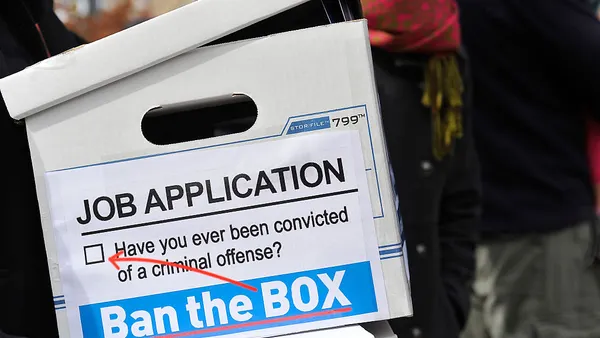Dive Brief:
- Stan Koch & Sons Trucking violated federal law when it retaliated against a former employee who filed a claim with the U.S. Equal Employment Opportunity Commission (EEOC), the EEOC alleged in a recently filed lawsuit.
- EEOC said in a statement that the company violated Title VII of the Civil Rights Act of 1964, which forbids workplace discrimination and retaliation, when it did not allow the worker to apply for re-employment because she had filed an EEOC sex discrimination charge against the company.
- "Refusing to hire an individual because she filed an EEOC charge is retaliation," said Gregory Gochanour, EEOC's regional attorney in Chicago. "That is the law, and the EEOC will hold employers accountable if they violate it."
Dive Insight:
Equal employment opportunity laws forbid punishing job applicants or employees for asserting their right to make a claim under employment anti-discrimination laws. For example, it is unlawful to retaliate against job applicants or employees for filing a charge with the EEOC or a lawsuit alleging workplace discrimination.
Retaliatory acts, according to the EEOC, can include reprimanding the employee or giving a performance evaluation that is lower than it should be; transferring the employee to a less desirable position; engaging in verbal or physical abuse; threatening to make, or making, reports to authorities such as reporting immigration status or contacting the police; increasing scrutiny; or making the person's work more difficult by, for example, purposefully changing his or her work schedule to conflict with family responsibilities.
If an employee has engaged in protected activity but discipline is legitimately required, it's especially important for managers and supervisors to have strong documentation, including a clear record of the facts that justify the disciplinary action. Managers and supervisors should understand that timing alone can establish a prima facie case of retaliation, attorneys have previously told HR Dive.
FisherBroyles LLP Partner Eric B. Meyer has recommended that if an internal complaint of discrimination or an EEOC charge is received, the alleged harasser and others named in the action should be informed that they cannot retaliate against the person making the complaint. Retaliation stand as an independent claim against an employer even if the EEOC or a court concludes there is no merit to the underlying claim of discrimination.













